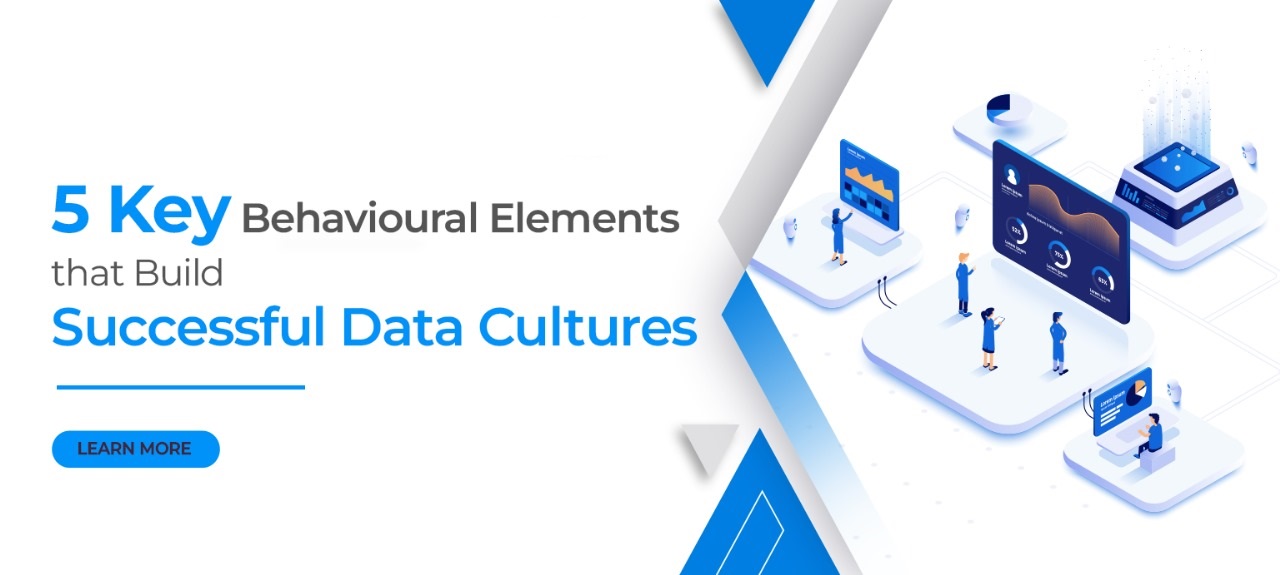Data transformation is the core of digital transformation, and it depends on how people interact with each other. The information flows between employees, customers, and partners are crucial for any organisation’s success. That’s why the first step to effective data transformation is to adopt a human-centred approach that considers how your people experience data and technology.
However, changing human behaviour is not easy. It often requires a huge effort in change management. What are the key behaviours and practices that create good data cultures?
To become truly data-driven, organisations need to change their mindsets, attitudes, and habits to value data quality. People have to be motivated to use data and inspire others to do the same.
Therefore, successful data cultures usually pay attention to these 5 important behavioural aspects:
1) Trust:
Trust is a fundamental element of a successful data culture. Effective leaders trust their people, and in turn, empower them with trusted data to make confident decisions. This requires a solid data governance model that ensures secure, widespread access to a single source of truth. By breaking down silos and encouraging collaboration, organizations can build trusting relationships and share data across the entire organization. This fosters a culture of accountability and enables the identification of impactful solutions.
2) Commitment:
Commitment is crucial for creating a successful data culture. Organizations must go beyond simply storing and collecting data; they need to help people use data to make better decisions. This commitment should be evident throughout the organization, from the organizational structure to day-to-day processes. Assigning an executive who is accountable for data use and ensuring that analytics projects align with critical business efforts is essential. By treating data as a strategic asset, organizations demonstrate their commitment to leveraging data for improved outcomes.
3) Talent and Skills:
To become data-driven, organizations must prioritize data literacy and equip their employees with the necessary skills. It is not enough for a few data experts to exist within the organization; everyone should feel confident in working with data. Identifying data champions across departments, who possess a deep understanding of company processes and challenges, can greatly contribute to building a data-driven culture. Organizations should prioritize data literacy skills during recruitment, development, and talent retention. By fostering a culture of continuous learning and providing tailored training, organizations empower their employees to become data-driven decision-makers.
4) Sharing:
Creating a sense of community and encouraging active sharing is vital for a successful data culture. Employees must have a shared purpose of using data to improve the organization and amplify its impact. This can be achieved through various channels such as meetups, messaging groups, and portals. By formalizing internal communities around data and analytics, organizations can facilitate collaboration and overcome data overwhelm. Sharing best practices and encouraging learning, coaching, and documentation create a supportive environment for data-driven decision-making.
5) Mindset:
A data-driven mindset is a catalyst for innovation and growth. Organizations must foster a culture where curiosity and challenging assumptions with data are encouraged. This mindset shift goes beyond developing technical data skills; it involves embracing data-led decision-making as a source of personal and professional growth. Open discussions and idea generation based on data insights drive exploration and innovation. By using data as a catalyst for improvement and aligning it with long-term business goals, organizations can unlock the full potential of their data.
The Bottom Line:
Building a successful data culture requires more than just technological investments; it relies on the five key behavioural elements discussed in this blog: trust, commitment, talent and skills, sharing, and mindset. Organizations that prioritize these elements create an environment where data-driven decision-making becomes ingrained in the organizational DNA. By embracing a data-centric culture, organizations can unlock the full potential of their data, drive innovation, improve operational efficiency, and achieve sustainable growth in today’s data-driven landscape.
Transform your business by fostering a thriving data-centric culture with Salesforce Solutions, powered by CSA Consultants. Salesforce Solutions provide a comprehensive suite of data-centric solutions that help organizations leverage their data effectively. With Salesforce, organizations can build a strong data culture by implementing robust data governance, driving data literacy initiatives, fostering collaboration, and empowering employees to make data-driven decisions.

























